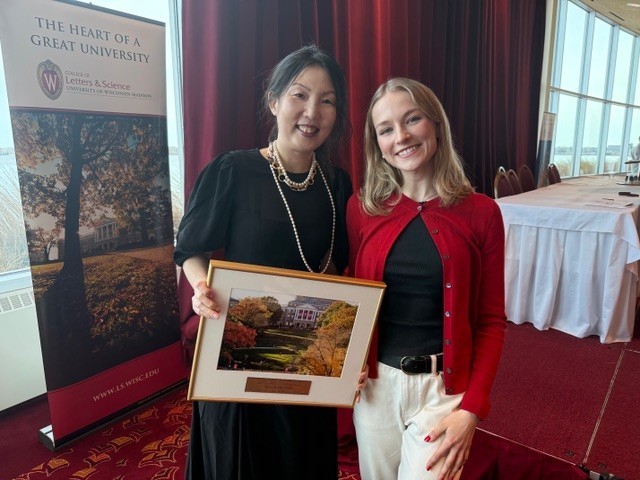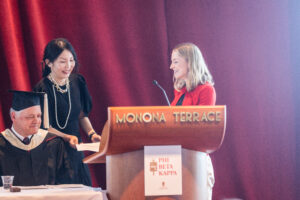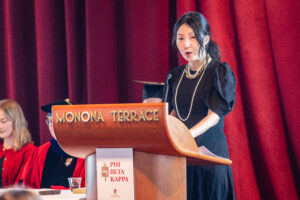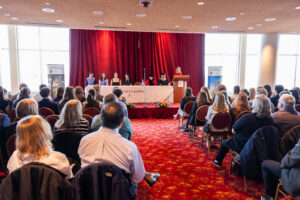
This spring, Professor Young Mie Kim was awarded the Phi Beta Kappa Teaching Excellence Award and recognized for her impact on her students and influence on their intellectual and human development. Each year, students elected to Phi Beta Kappa nominate their favorite professors with the recipient selected by Phi Beta Kappa officers. Kim was nominated by Kate Lewicki (X’26).
“Dr. Kim embodies the highest ideals of liberal arts and science education and UW–Madison. She encourages critical thinking, fosters interdisciplinary dialogue and challenges her students to apply course concepts to real-world contexts. Her mentorship as not only refined me academic interests but has prepared me to approach legal and media-related challenges with a well-informed, media-literate, research-driven (least-biased-as-possible) perspective,” Lewicki said in her nomination of Kim.
Kim shared what this award means to her and what she hopes her students take away from her courses.
What does this award mean to you personally and professionally?

Receiving the Phi Beta Kappa Teaching Excellence Award is deeply meaningful to me, both personally and professionally. It is a humbling recognition, particularly because Phi Beta Kappa stands for intellectual integrity, the pursuit of knowledge, and liberal education’s vital role in democracy — values I deeply cherish. Personally, coming from a family of educators, this award resonates with me profoundly. It affirms that the purpose and impact of teaching extend beyond personal achievement or academic prestige, reinforcing my belief in teaching as a form of public service, community-building, and meaningful engagement.
This award honors your commitment to undergraduate education. How do you approach your teaching to inspire and engage your students?
My teaching philosophy is grounded in engaged scholarship, inspired by Ernest Boyer’s vision of scholarship as both rigorous and relevant. I approach teaching not as a traditional, top-down transfer of knowledge, but as a reciprocal, collaborative process of co-creating knowledge alongside my students. This means actively connecting classroom learning to pressing social and civic problems and encouraging students to view themselves as active participants in their own education. I strive to inspire students by cultivating a classroom environment where they feel empowered to engage critically, creatively, and constructively with the complex issues that affect our society.
You’ve done such impactful work in areas like political communication and misinformation. How do you bring that research into the classroom to enrich student learning?

Integrating my research into the classroom is essential to my teaching approach. First, as an empirical social scientist, I emphasize a hypothesis-driven mindset and evidence-based reasoning, both fundamental for rigorous academic inquiry and necessary for developing sound public policies that lead to meaningful social change. By engaging with policymaking communities, including collaborations with policy think tanks and assisting lawmakers in crafting legislation such as the Honest Ads Act, I experienced how vital systemic and scientific evidence is to effective policy formulation. In my courses, students not just read course materials, but also analyze research evidence and find counter-evidence by themselves to evaluate the current policy debates, for example. Second, a social scientist strives to critically analyze systemic social issues and find the root causes of pressing social problems, I also want my students to see the big picture and seek to find collective solutions. For instance, in my Misinformation in the Digital Media Age class, we discuss how disinformation campaigns exploit vulnerabilities such as economic precarity and political polarization through algorithmic echo chambers that isolate individuals, amplify falsehoods, and erode democratic institutions. Students learn that combating misinformation requires more than digital literacy or fact-checking; it demands rebuilding civic infrastructures and media ecologies that support truth, trust, and pluralism. By critically evaluating current policy debates, analyzing research evidence, and assessing the strengths and limitations of arguments, my students gain a nuanced understanding of the pressing social issues and how they can actively contribute to solutions.
What do you hope students take away from your courses, not just as scholars but as citizens?
 Beyond academic knowledge, I hope my students emerge from my courses as thoughtful, engaged, and responsible citizens. Ultimately, I hope they develop the skills and motivation to acknowledge societal complexities, engage respectfully with differences, and actively participate in civic life to uphold democracy and social justice. My greatest aspiration is captured by an old Korean saying, 청출어람, meaning “blue extracted from the indigo plant is bluer than the plant itself.” I want my students to surpass their teachers — to think more boldly, act more bravely, and contribute more meaningfully to democratic renewal. When that happens, the future will be brighter for all of us.
Beyond academic knowledge, I hope my students emerge from my courses as thoughtful, engaged, and responsible citizens. Ultimately, I hope they develop the skills and motivation to acknowledge societal complexities, engage respectfully with differences, and actively participate in civic life to uphold democracy and social justice. My greatest aspiration is captured by an old Korean saying, 청출어람, meaning “blue extracted from the indigo plant is bluer than the plant itself.” I want my students to surpass their teachers — to think more boldly, act more bravely, and contribute more meaningfully to democratic renewal. When that happens, the future will be brighter for all of us.
How does this recognition shape or reinforce your vision for the future of journalism education at UW-Madison?
This recognition reinforces my commitment to evolving journalism education at UW-Madison toward an engaged, civically-oriented model. It strengthens my vision for journalism education as a crucial platform not only for understanding and analyzing societal issues but actively addressing them. Moving forward, I envision journalism education continuing to foster critical thinkers and active civic participants, equipping students with the analytical rigor, ethical grounding, and practical skills necessary to navigate — and positively shape — our complex media landscape and democratic society.